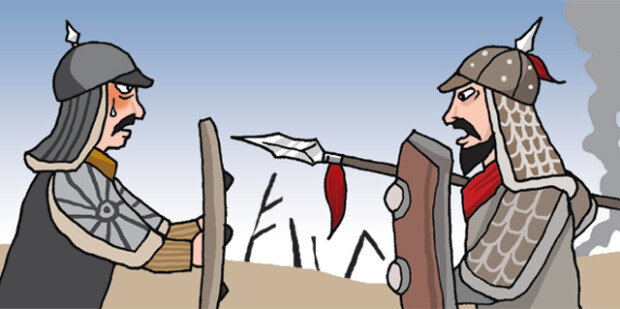Defense without offense is not defense
Defense without offense is not defense
Posted August. 14, 2018 07:40,
Updated August. 14, 2018 07:40

Some say offense is the best defense. Others say defense is the start of offense. Who is right? The answer would be both, but this certainly poses a conundrum for those who are actually entrusted to choose between the two opposite strategies. Which should go first? There would be not a trickier question in history of warfare. Even the World Cup history shows that some champions preferred attacks, while others were defense-oriented. There has not been any clear-cut answer, but the debate itself has revealed a fallacy that people are apt to commit. In an offense strategy, defense must not be ignored, and in a defense strategy, offense should never be neutered.
In the late 14th century, Korea saw an increasing number of Japanese invasions. Korea sought to beef up the coastal defense, but sparsely dispatched, the Korean forces would often be destroyed one by one. When the forces were concentrated in one spot, the Japanese would find unmanned areas and land there, looting and pillaging. Indignant with the inability of the government, Lee Saek, a young scholar in the Goryeo Dynasty, filed an appeal with King Gongmin. Citing the Japanese’ strategic advantage of seeking for a chance from open seas, he claimed that the strategy of defending the land only would not work. So he argued that Korea should forge navy forces and go out to the seas to wipe out Japanese invaders. This was called a “Sea Defense Strategy.” Korea adopted this method, managing to mitigate the damage from the invasion at last.
Defense is not completed with defensive efforts alone. One must attack the opponents to weaken their offensive capacity and fight not to hand over the control of the battle, for successful defense. Defense does not refer to a state of neutered offense. South Korea is not invading other countries. Our military exists to defense our territory, but it should not be deprived of its offense capacities and strategies, as doing so will likely neutralize not only our offensive edge but the military’s defense capacity.
Removing attack weapons makes no sense either. A sword is an attack weapon, and armor and shield is a defense weapon. But the symbolism of each tool should not be confused with the actual deployment of the two different strategies. When attacking, the attacker does not voluntarily lose his armor and shield. When defending, the defender does not abandon his sword. However, this nonsense is actually taking place in our society. This is not just worrisome; it is simply outrageous.







